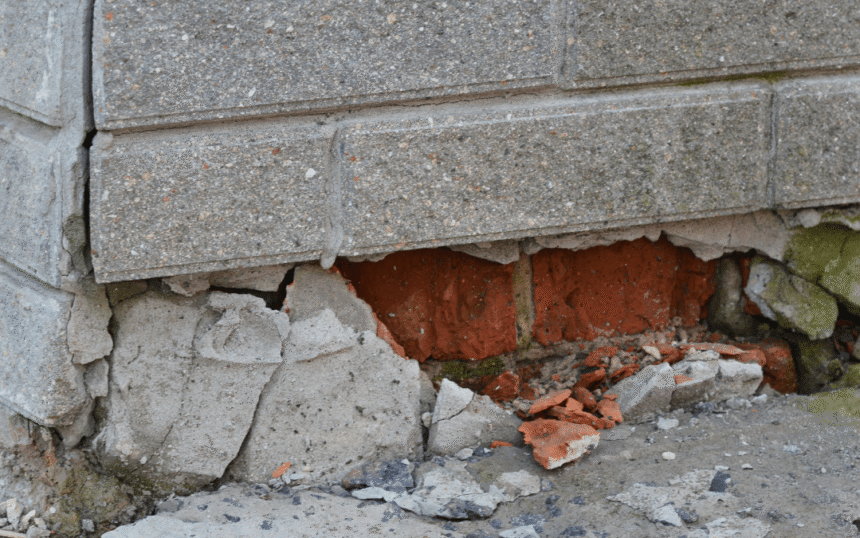Are you aware that foundation issues can lead to severe structural damage if left unaddressed? If you’re a homeowner facing cracks in your walls or uneven floors, you might be tempted to tackle DIY foundation repairs. However, while this approach may seem cost-effective, it can often lead to unforeseen complications. This article will help homeowners navigate the challenging decision of whether to take on foundation repairs themselves or hire professionals. We’ll explore the potential risks of misdiagnosing problems and the importance of having the right tools and expertise. Additionally, we’ll discuss how professional help ensures compliance with building codes and safeguards your property value. By the end, you’ll have a clearer understanding of the implications of DIY foundation repairs and the peace of mind that comes from making an informed choice. Join us as we delve deeper into the pros and cons, empowering you to make the best decision for your home.
Evaluating the Scope of Foundation Issues
How can you determine if foundation issues are minor or need professional help?
To assess foundation issues, start with a detailed inspection. Minor cracks may be manageable with DIY solutions, while larger fissures or signs of settling often indicate serious structural concerns that necessitate professional evaluation.
Environmental factors, such as expansive clay soils or poor drainage, can exacerbate these problems, leading to more significant damage if ignored.
- Inspect for cracks and signs of settling.
- Consider environmental conditions affecting your foundation.
- Consult a professional for a comprehensive assessment if in doubt.
Understanding these factors helps you decide whether to attempt repairs yourself or enlist expert assistance. For more insights, see our guide on identifying and addressing foundation problems.
Weighing the Costs: DIY Vs Professional Repairs
How do DIY repairs compare to professional services for foundation issues?
When faced with foundation problems, homeowners must decide between DIY repairs and hiring professionals.
While DIY projects may save money by only requiring payment for materials, the risks can be significant. Inexperienced repairs might misdiagnose issues, leading to ineffective solutions and higher costs in the long run. Additionally, subpar repairs can negatively impact property value, deterring potential buyers.
Inexperienced DIY repairs risk higher costs and reduced property value, deterring buyers.
On the other hand, professional services, while more expensive upfront, offer efficiency, reliability, and peace of mind through warranties and insurance.
Homeowners should carefully weigh potential savings against the risks of amateur work before making a decision.
For more insights on home repair decisions, see our guide on evaluating repair options.
Understanding the Risks of DIY Foundation Repair
What’re the risks associated with DIY foundation repair?
When engaging in DIY foundation repair, it’s crucial to understand the associated risks that can arise. Misdiagnosing structural issues may lead to inadequate repairs, worsening existing problems and incurring significant expenses later on.
Additionally, safety hazards such as heavy lifting and working in tight spaces can pose serious dangers without proper training.
- Improper tools can lead to ineffective repairs.
- Lack of warranties means mistakes result in out-of-pocket costs.
- Delayed repairs can exacerbate foundational issues.
Before attempting any repairs, consider these risks carefully. For further guidance, check out our comprehensive guide on professional foundation repair options.
Tools and Skills Required for DIY Foundation Repair
How do you prepare for DIY foundation repair?
Preparing for DIY foundation repair involves understanding the tools and skills necessary to execute the project effectively.
Essential tools include hydraulic jacks, soil compactors, and concrete mixers, which may not be found in a typical home garage.
It’s crucial to master construction techniques to avoid further structural damage and ensure safety during the repair process.
- Conduct a thorough inspection to identify issues like soil settlement or moisture intrusion.
- Equip yourself with appropriate safety gear such as gloves, hard hats, and eye protection.
- Familiarize yourself with local building codes to avoid compliance issues.
For more detailed guidance on foundation inspection techniques, see our comprehensive guide on home repairs.
The Importance of Building Codes and Compliance
Adhering to building codes during DIY foundation repairs is crucial for safety and long-term property value.
But how can you ensure that your repairs meet these important regulations?
Let’s explore the key aspects of compliance and the potential impacts on your investment.
Ensuring Structural Safety
How can homeowners ensure structural safety during foundation repairs?
Ensuring the structural safety of your home during foundation repairs is critical. Adhering to building codes is essential as it guarantees that safety regulations are met, thus preserving your home’s integrity.
Ignoring these codes can lead to legal complications, decreased property value, and potential issues with insurance claims.
To maintain compliance and safety, consider hiring professional contractors who are familiar with local regulations. DIY repairs may inadvertently violate these codes, putting your home at risk.
- Consult local building authorities for specific requirements.
- Hire licensed professionals to guarantee adherence to regulations.
- Regularly inspect your home for signs of foundation issues.
For more insights on maintaining your home’s safety, check out our guide on essential home inspections.
Avoiding Legal Penalties
How can homeowners ensure compliance during foundation repairs?
To avoid legal penalties during foundation repairs, homeowners must adhere to local building codes and obtain necessary permits. Ignoring these regulations can result in significant fines, compromised insurance coverage, and increased liability for any damages caused to neighboring properties.
- Always check local regulations before beginning work.
- Secure the proper permits to protect your investment.
- Consider hiring a professional to ensure compliance with safety standards.
Maintaining Property Value
How do building codes protect property value?
Building codes play a vital role in preserving your property’s value by ensuring safety and compliance during repairs.
Adhering to these regulations prevents hidden issues from surfacing later, which could deter potential buyers. Moreover, following the codes helps maintain structural warranties, shielding you from unexpected financial burdens.
- Ensure all repairs are documented for transparency.
- Consult with professionals to guarantee compliance.
- Regularly review local building codes to stay updated.
By prioritizing adherence to building codes, you not only safeguard your investment but also enhance your property’s marketability.
For more insights, check out our guide on maintaining property value effectively.
Long-Term Implications of Foundation Repair Choices
When deciding between DIY and professional foundation repairs, consider the long-term impacts on your property’s value and structural integrity.
Have you thought about how the choice you make could influence future repair costs? Understanding the benefits of professional services could save you money and enhance your home’s appeal.
Impact on Property Value
How do foundation repairs affect property value?
Choosing between DIY and professional foundation repairs can significantly influence your property’s long-term value.
Poorly executed DIY fixes often raise concerns about your home’s structural integrity and compliance with building regulations. Buyers typically prefer homes with professional repairs, which can enhance marketability and resale values.
- Peace of Mind: High-quality repairs minimize future maintenance, making your home more appealing.
- Resale Values: Professional repairs can elevate property value, while DIY errors may lead to expensive problems.
- Buyer Confidence: Documented professional work reassures buyers regarding potential foundation issues.
Without warranties, DIY repairs might cause potential buyers to hesitate, affecting your property’s perceived worth.
For more insights, see our guide on maximizing property value.
Repair Costs Over Time
How do DIY foundation repairs impact long-term costs?
While DIY foundation repairs might appear economical initially, they often result in higher costs over time due to improper methods that can exacerbate existing issues.
Homeowners who attempt these fixes themselves may face escalating expenses if their amateur work leads to structural damage. Unlike professional services, DIY repairs lack warranties, providing no financial safety net.
- Minor issues can grow into major problems, increasing repair expenses.
- Potential buyers may be wary of homes with DIY repairs, resulting in lower offers.
- Professional repairs, though pricier upfront, come with warranties that ensure effective resolution of issues.
For more insights on managing home repairs, check out our guide on professional vs. DIY choices.
Structural Integrity Considerations
How do DIY foundation repairs affect structural integrity?
While DIY foundation repairs may appear to save money initially, they can have significant long-term implications for your home’s structural integrity. Many homeowners misdiagnose foundation issues, overlooking the root causes and leading to recurring problems that compromise safety.
Additionally, professional services ensure compliance with building codes, which is vital for maintaining structural stability.
- Ignoring underlying issues can result in escalating damage.
- Professionals utilize advanced tools for effective repairs.
- Lack of warranties on DIY attempts may lead to unexpected costs.
Investing in professional services may seem costly upfront, but it ultimately protects your home from severe damage.
For more insights on maintaining your home’s integrity, see our guide on foundation maintenance.
When to Consider Hiring a Professional Contractor
When Should You Hire a Professional for Foundation Repairs?
How can you determine when it’s time to enlist a professional contractor for foundation repairs? Consider hiring one if you encounter serious issues like large cracks or signs of structural instability.
Professionals possess the necessary expertise and advanced tools for comprehensive assessments and effective repairs, ensuring compliance with local building codes.
- They can identify hidden issues that may worsen over time.
- Licensed contractors offer warranties and insurance, providing financial protection.
- Quick turnaround times can minimize disruption to your life.
If you’re unsure about the extent of the damage, see our guide on recognizing foundation issues for more insights.
Frequently Asked Questions
Can You Do Your Own Foundation Repair?
FAQ
Q: Is it possible to do your own foundation repair? A: Yes, you can do your own foundation repair if you have the right skills and tools.
Q: What skills do I need for DIY foundation repair? A: Basic construction skills and knowledge of foundation issues are essential for effective DIY foundation repair.
Q: How much time does DIY foundation repair take? A: The time required for DIY foundation repair varies based on the damage’s extent and your experience level.
Q: What materials are needed for foundation repair? A: Common materials for DIY foundation repair include concrete, epoxy, and reinforcement tools.
Q: When should I hire a professional for foundation repair? A: If the damage is extensive or beyond your expertise, it’s wise to seek professional help for foundation repair.
Do Foundation Repairs Devalue a Home?
FAQ
Q: Do foundation repairs affect a home’s value? A: Yes, foundation repairs can impact a home’s value. Properly done repairs may enhance its worth, while poor work could decrease appraisal values.
Q: How do foundation issues influence home resale? A: Foundation issues can deter buyers and lower resale prices. Addressing them before selling may improve buyer confidence and overall market value.
Q: Are foundation repairs a good investment? A: Foundation repairs can be a wise investment if they restore structural integrity and boost property value, but assess local market trends first.
Q: Will buyers avoid homes with foundation repairs? A: Some buyers may hesitate due to foundation repairs, especially if they’re poorly executed. Transparency about repair quality is crucial for attracting offers.
Q: What is the best way to handle foundation repairs before selling? A: Ensure repairs are professionally done and documented. This can reassure potential buyers and help maintain or even increase your home’s value.
What Is the Best Foundation Repair Method?
FAQ
What is the best foundation repair method? The best foundation repair method depends on your specific foundation type and the underlying issues affecting it.
How much does foundation repair cost? Costs for foundation repair can vary significantly, influenced by methods like crack filling, underpinning, and waterproofing solutions.
What are the common foundation repair techniques? Common foundation repair techniques include underpinning, crack filling, and soil stabilization, each suited to different foundation types.
How do I know if I need foundation repair? Signs of foundation issues include cracks in walls, uneven floors, and gaps around windows or doors. A professional inspection can confirm the need for foundation repair.
Is waterproofing necessary for foundation repair? Yes, waterproofing solutions are important in foundation repair to prevent moisture-related damage and ensure long-lasting stability.
Are Foundation Repairs Worth It?
FAQ
Q: Are foundation repairs really necessary? A: Yes, foundation repairs are essential to maintain safety, structural integrity, and property value.
Q: How much do foundation repairs typically cost? A: The cost of foundation repairs varies based on severity and methods used, but investing in repairs is often worthwhile for long-term benefits.
Q: What are the signs that I need foundation repairs? A: Common signs include cracks in walls, uneven floors, and doors that stick or won’t close properly.
Q: Can I do foundation repairs myself? A: DIY foundation repairs are risky. Professional help ensures safety, proper material use, and lasting results.
Q: How do foundation repairs affect home value? A: Foundation repairs can significantly enhance property value by ensuring structural stability and preventing further damage.
Q: Is it worth investing in foundation repairs? A: Yes, foundation repairs are worth it for preserving your home’s safety, aesthetics, and overall marketability.
Conclusion
In conclusion, while DIY foundation repairs might seem appealing, the complexities often outweigh the benefits. Understanding the risks and the potential for costly mistakes can help you make informed decisions about your home. By applying the strategies outlined in this article, you can safeguard your investment and ensure a stable foundation, ultimately saving you time and money. If you’re facing significant issues or feel uncertain about the process, consider consulting a professional. For more insights on home maintenance, explore additional tips or read our related guide on foundation care to take the first step in protecting your home.


